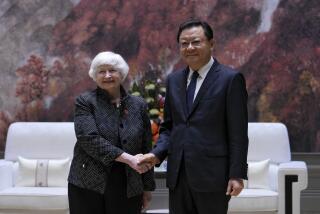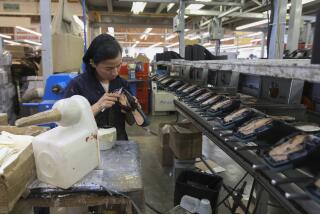Chinese firm to buy pork producer Smithfield Foods
China is hungry.
The world’s most populous country has for years been on an agricultural buying binge, scooping up supplies of soybeans, palm oil, cotton and just about anything else that can be culled from the soil.
Now, with 1.3 billion mouths to feed, the Asian giant is turning its eyes to meat.
On Wednesday, a Chinese meat processor agreed to purchase the world’s largest pork producer, Smithfield Foods Inc., for $4.7 billion.
The deal, the largest-ever purchase of a U.S. company by a Chinese firm, underscores the rapidly evolving taste of China’s growing middle class, which is demanding more high-quality protein in a nation that has been beset by food safety scares.
But the deal also speaks to the increasingly dominant role of China in global agriculture.
Once limited to purchasing other nations’ crops on the open market, the world’s second-largest economy has steadily moved to take control of production. Over the last decade, it’s been buying up vast acreage overseas and spending billions to lock down long-term supplies of key staples. If approved by regulators, the Smithfield deal would give China one of the most prestigious names in the lucrative meat industry.
“This is a sign of a maturing agriculture industry in China,” said Scott Rozelle, an expert on Chinese agriculture policy at Stanford University. “Chinese companies want more control over food. We’re going to see a lot more deals like this.”
Driving the trend is booming meat consumption.
In 1978, Chinese collectively ate just a third of the meat that Americans did. Last year, they consumed twice as much, according to the U.S. Department of Agriculture.
And no animal lands on more plates than the pig. In 2010, China consumed 51 million metric tons of pork, nearly half the swine in the world, according to the U.S. Census Bureau. By comparison, Americans ate just under 9 million metric tons of pork that year and about 13 million metric tons of chicken.
China’s domestic producers have struggled to meet the rising demand. Production costs, driven by labor, land, fuel and feed prices, have risen sharply, and China has responded by increasing foreign imports. Purchases of American pork, for example, are up 154% in the last five years.
Meanwhile, China’s food producers have gained a reputation for stomach-churning scandals.
They include bacteria-laden pork that glowed in the dark, rice contaminated by cadmium, rat meat masquerading as mutton and baby formula laced with toxic chemicals that killed six infants.
Experts say it’s not surprising that Shuanghui International Holdings agreed to pay a 31% premium for Smithfield, or $34 a share. The Hong Kong-based conglomerate also owns China’s largest meatpacker, which itself faced a food scandal in 2011, when an investigation found its pigs were given clenbuterol, a growth-enhancing drug that is banned in the U.S. and Europe.
Smithfield is the world’s largest producer of pork, with a multitude of products sold to customers around the world. By acquiring the storied Virginia company Shuanghui has the opportunity to put a trusted foreign brand before ravenous but wary Chinese consumers.
“The gamble is that selling pork under a name like Smithfield might command a premium,” said Deborah Brautigam, an expert on agricultural trade policy at Johns Hopkins University.
Smithfield stock closed up $7.38 a share, or 28.4%, at $33.35 on Wednesday.
The Smithfield purchase is hardly China’s first walk down the aisle of the world’s supermarket.
China’s investments in the oil and finance sectors far outpace its agricultural endeavors. Of 2,411 Chinese-led acquisitions over the last decade, 41% have focused on energy and power companies, compared with 4% centered on consumer staples.
But in recent years, the country has been on something of a food shopping spree. It more than doubled its investment in foreign agriculture between 2007 and 2010, according to the nation’s Ministry of Commerce.
The country has shored up the pipeline for soybeans — a crucial staple for humans, animals and biofuels in China — by pumping billions of dollars into land acquisition, farming and long-term crop purchase guarantees in Brazil and Argentina.
One recent deal, for example, had a Chinese grain and oil producer paying $7.5 billion and promising to build a railroad in exchange for a guaranteed supply of 6 million tons a year of Brazilian soybeans.
So insatiable has been China’s interest in South America’s fertile fields that both countries have passed laws limiting foreign ownership of arable land in recent years.
In Africa, China has been buying up supplies of cotton, while in Southeast Asia it’s invested heavily in crops as diverse as natural rubber, cashews and palm oil, which is used for food and also fuel.
Lately, however, the push has gone beyond plants.
In a country that traditionally did not consume much dairy, growing incomes and exposure to Western restaurant brands have fueled demand for milk and cheese.
In the last few years, China has become the world’s leading purchaser of dairy cows — bringing in 100,00 head of young heifers last year alone — and has imported a variety of breeding stock to boost its domestic production.
Instead of dedicating increasingly expensive arable land to crops such as corn or soybeans, the country has been importing those commodities to feed livestock.
And unlike in the U.S. or Brazil, which export huge quantities of meat, almost all of China’s production is consumed at home.
“Demand is good there and the economy’s still growing — they have more and more people moving to the middle class and upgrading their diet,” said Steve Meyer, a former economics director for the National Pork Board and president of agricultural analysis firm Paragon Economics Inc.
“And the Chinese like their pork,” he said.
Smithfield’s sale to Shuanghui was unanimously approved by both companies’ boards.
Smithfield Chief Executive C. Larry Pope said in a statement Wednesday that executives “do not anticipate any changes in how we do business operationally.”
If the takeover closes as expected in the latter half of the year, Pope will retain his post and the $13-billion company will keep its headquarters in Smithfield, Va.
None of its facilities will close and its 46,000 employees will hold on to their jobs, collective bargaining agreements intact, the companies said.
But the deal may face opposition. The U.S. government is certain to scrutinize the transaction for antitrust concerns. Trade unions and environmentalists are already raising flags.
“This will lead to an increase in production of pigs here … leaving us with dwindling natural resources, increased greenhouse gas emissions, and even more pig manure dumped on lands across the country — a problem that has been polluting communities and water supplies across the country for years,” said the Waterkeeper Alliance, a green advocacy group.
Wenonah Hauter, executive director of consumer advocacy group Food & Water Watch, said the Smithfield purchase would cause more “farmer exploitation, more factory farms and a more complicated supply chain that leaves consumers at a higher risk of food contamination.”
But Stanford’s Rozelle disagrees, noting that the U.S. has for years struggled to attract foreign investment in agriculture. A big investment such as this, he said, will help protect American jobs and also introduce Chinese companies to better technology and food safety practices.
“This is good for everybody,” he said. “There’s nothing to be afraid of.”







